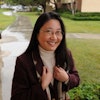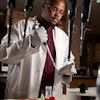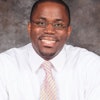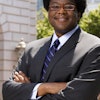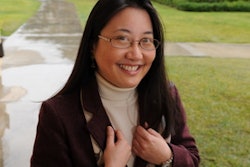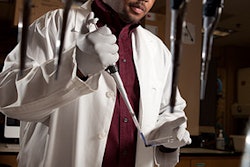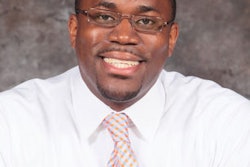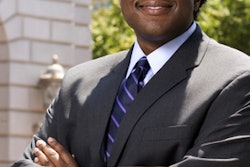“Math is so boring. Math is so hard.” Dr. Mariel Vazquez often hears these comments from elementary school students. It pains her because she always has loved mathematics.
Vazquez is an internationally known researcher in the emerging field of DNA topology. Vazquez, an associate professor of mathematics at San Francisco State University, studies how human DNA, the DNA of bacteria and the DNA of viruses become untangled. Her work could affect the design of antibiotics and anti-cancer drugs.
Earlier this year, Vazquez received a National Science Foundation Faculty Early Career Development, or CAREER, award for her research.
“Math is so boring. Math is so hard.” Dr. Mariel Vazquez often hears these comments from elementary school students. It pains her because she always has loved mathematics.
Vazquez is an internationally known researcher in the emerging field of DNA topology. Vazquez, an associate professor of mathematics at San Francisco State University, studies how human DNA, the DNA of bacteria and the DNA of viruses become untangled. Her work could affect the design of antibiotics and anti-cancer drugs.
Earlier this year, Vazquez received a National Science Foundation Faculty Early Career Development, or CAREER, award for her research.
A native of Mexico and the daughter and granddaughter of engineers, Vazquez was drawn early on to math. “I loved math but didn’t think becoming a mathematician was a career option,” she says. In high school she became passionate about molecular biology and enjoyed working with DNA and learning about proteins and cells.
At the National University of Mexico, or UNAM, Vazquez pursued mathematics, earning a research fellowship to the Mathematics Institute. As she became more interested in pure mathematics, she started losing hope of finding a career connection to molecular biology. One day when she was a sophomore she saw a flier for a series of lectures about knot theory and the study of DNA. “A friend and I went. It was intimidating, and I felt overwhelmed by all that information,” she recalls. “I didn’t understand most of it, but that day I discovered what I wanted to do.”
She combined her interests of pure mathematics and molecular biology and focused on the study of the emerging field of DNA topology.
Vazquez worked with knot theorist Dr. Max Neumann on an undergraduate thesis titled “Applications of Knot Theory to the Study of DNA.” The thesis was based on the work of Dr. De Witt Sumners of Florida State University.
“While doing my thesis I went knocking on doors of mathematicians, trying to learn more,” she recalls. She met Sumners twice before graduating. His work on the applications of knot theory to DNA fascinated her and became her doctoral topic. Vazquez pursued her Ph.D. in mathematics at Florida State University, where Sumners was her adviser.
“She is creative, brilliant, tenacious, intuitive, artistic, personable and courageous,” notes Sumners. “When I saw [her work], I knew she was the real thing, and I was lucky to get her as a student. It is always great to have students that are smarter than you are.”
“The students she mentors always seem to pick up some of her own mathematical clarity and highly professional approach,” says Dr. Rainer Sachs, emeritus professor of math and physics at Berkeley.
Vazquez was an academic visitor in the biochemistry department at the University of Oxford in England in 2006 and 2007. She was a visiting scholar at the University of California, Berkeley in 2008. Vazquez was an academic visitor at the Cancer Research Center in Salamanca, Spain, and an academic visitor at the molecular biology department in Barcelona, Spain.
Vazquez, 40, began working on the National Science Foundation grant in 2009. Last April, after nine reviewers meticulously pored over the material, Vazquez learned that she would receive almost $600,000 for research. The selection committee included biology scholars, math scholars and interdisciplinary scientists.
Vazquez plans to travel to Oxford where she will meet with her biology collaborator and spend time in the lab refining the biological questions that can be answered with her methods. She will work with an international group of mathematicians, biologists and computer scientists toward a goal of understanding the mechanism of an enzyme essential for DNA replication in the bacterium Escherichia coli.
In addition to her work and family, Vazquez has enjoyed organizing a math circle for children between first and third grade as part of the San Francisco Math Circles. Through her CAREER award she also will collaborate with the California Academy of Sciences museum to present DNA topology research to children and to the public. She has created a curriculum that’s not stuffy, Vazquez says. She knew she was on the right track when she heard one child say, “This isn’t math. This is fun.”
In high school she became passionate about molecular biology and enjoyed working with DNA and learning about proteins and cells.
At the National University of Mexico, or UNAM, Vazquez pursued mathematics, earning a research fellowship to the Mathematics Institute. As she became more interested in pure mathematics, she started losing hope of finding a career connection to molecular biology. One day when she was a sophomore she saw a flier for a series of lectures about knot theory and the study of DNA. “A friend and I went. It was intimidating, and I felt overwhelmed by all that information,” she recalls. “I didn’t understand most of it, but that day I discovered what I wanted to do.”
She combined her interests of pure mathematics and molecular biology and focused on the study of the emerging field of DNA topology.
Vazquez worked with knot theorist Dr. Max Neumann on an undergraduate thesis titled “Applications of Knot Theory to the Study of DNA.” The thesis was based on the work of Dr. De Witt Sumners of Florida State University.
“While doing my thesis I went knocking on doors of mathematicians, trying to learn more,” she recalls. She met Sumners twice before graduating. His work on the applications of knot theory to DNA fascinated her and became her doctoral topic. Vazquez pursued her Ph.D. in mathematics at Florida State University, where Sumners was her adviser.
“She is creative, brilliant, tenacious, intuitive, artistic, personable and courageous,” notes Sumners. “When I saw [her work], I knew she was the real thing, and I was lucky to get her as a student. It is always great to have students that are smarter than you are.”
“The students she mentors always seem to pick up some of her own mathematical clarity and highly professional approach,” says Dr. Rainer Sachs, emeritus professor of math and physics at Berkeley.
Vazquez was an academic visitor in the biochemistry department at the University of Oxford in England in 2006 and 2007. She was a visiting scholar at the University of California, Berkeley in 2008. Vazquez was an academic visitor at the Cancer Research Center in Salamanca, Spain, and an academic visitor at the molecular biology department in Barcelona, Spain.
Vazquez, 40, began working on the National Science Foundation grant in 2009. Last April, after nine reviewers meticulously pored over the material, Vazquez learned that she would receive almost $600,000 for research. The selection committee included biology scholars, math scholars and interdisciplinary scientists.
Vazquez plans to travel to Oxford where she will meet with her biology collaborator and spend time in the lab refining the biological questions that can be answered with her methods. She will work with an international group of mathematicians, biologists and computer scientists toward a goal of understanding the mechanism of an enzyme essential for DNA replication in the bacterium Escherichia coli.
In addition to her work and family, Vazquez has enjoyed organizing a math circle for children between first and third grade as part of the San Francisco Math Circles. Through her CAREER award she also will collaborate with the California Academy of Sciences museum to present DNA topology research to children and to the public. She has created a curriculum that’s not stuffy, Vazquez says. She knew she was on the right track when she heard one child say, “This isn’t math. This is fun.”
Title: Associate professor of mathematics, San Francisco State University
Education: Ph.D., Florida State University; B.Sc., National University of Mexico
Age: 40
Career Mentors: De Witt Sumners, Florida State University

